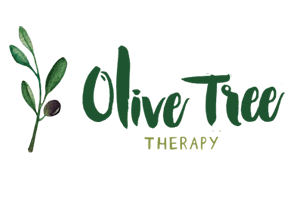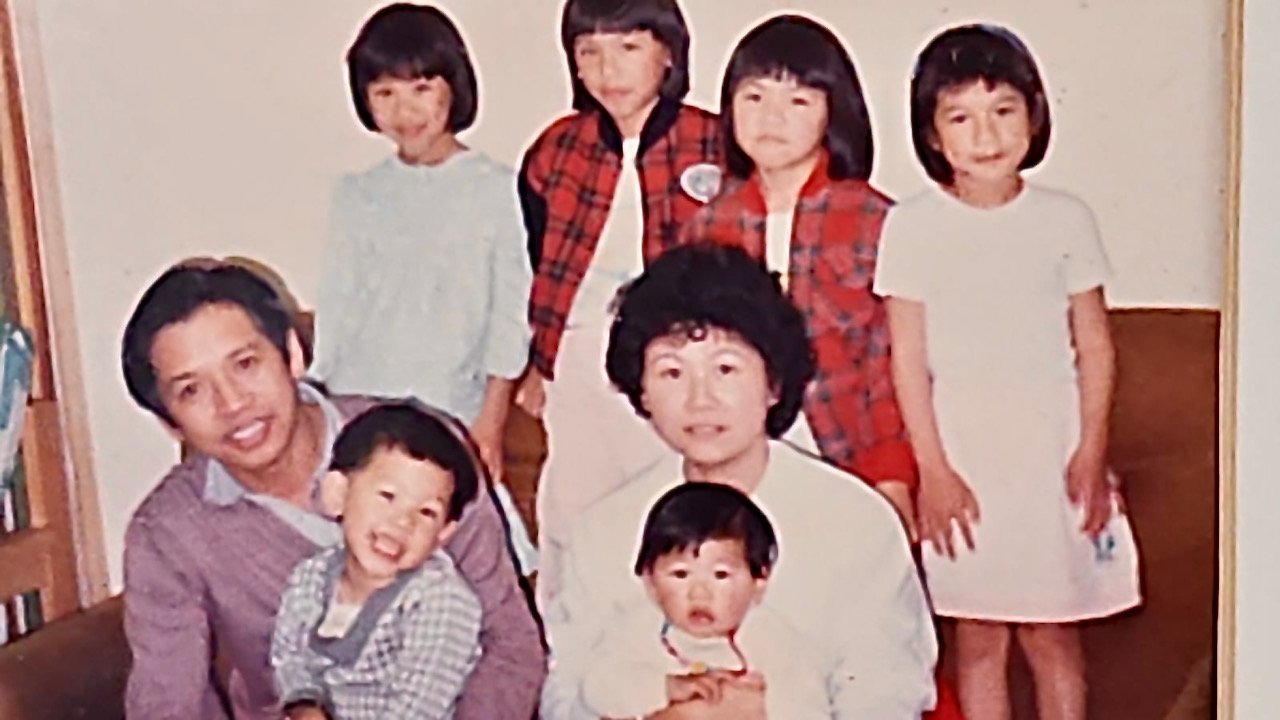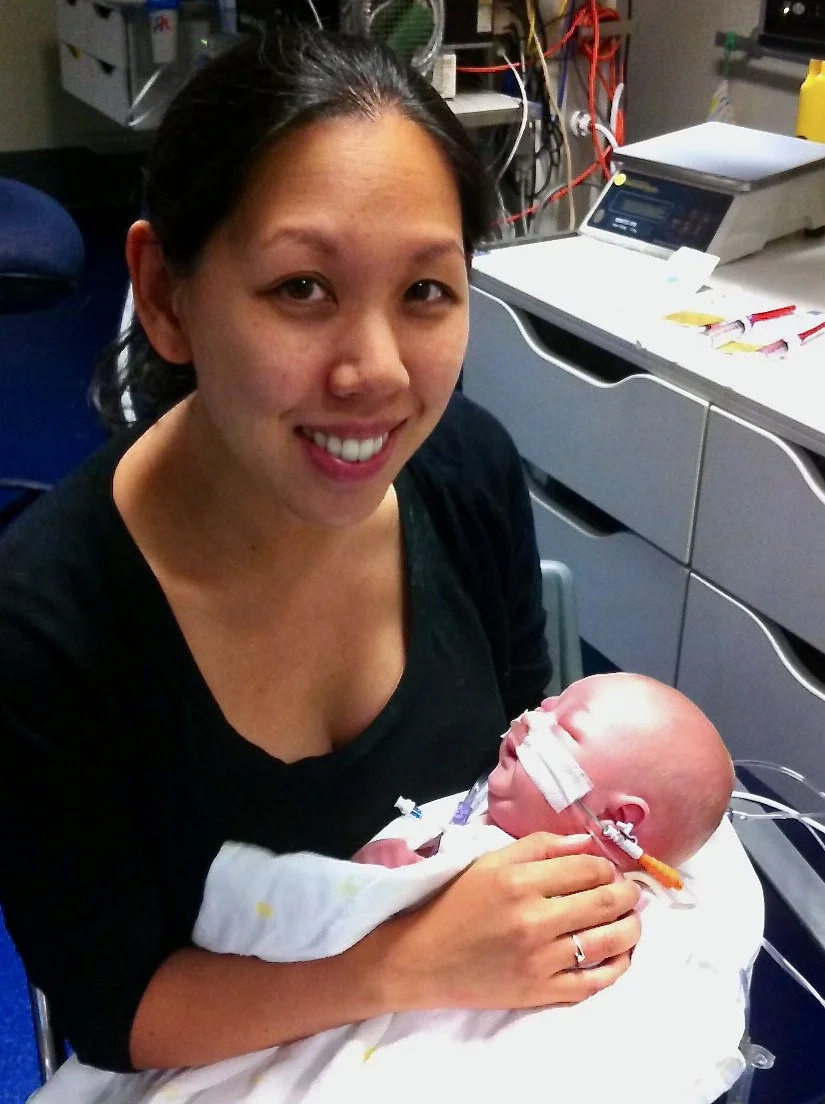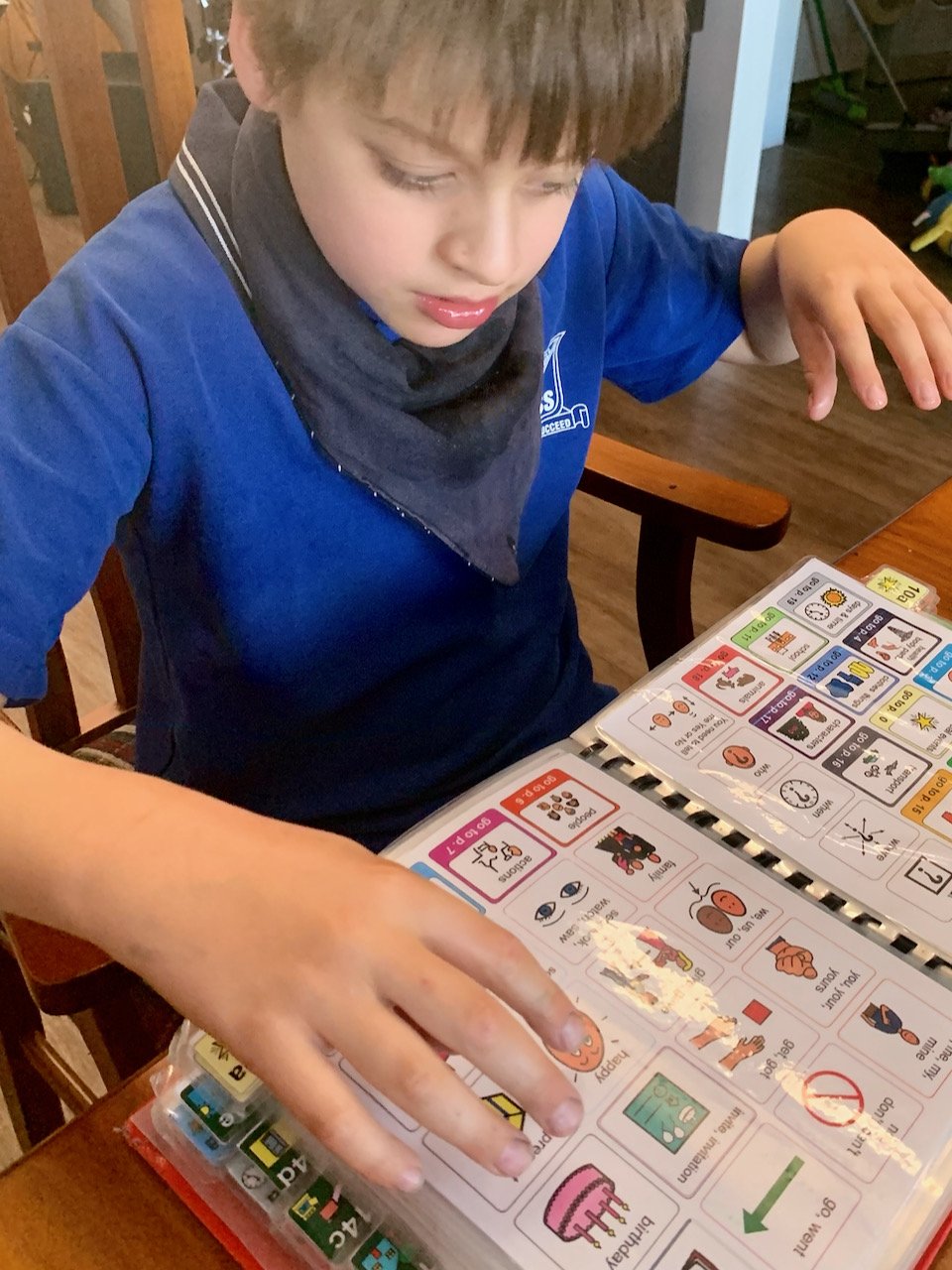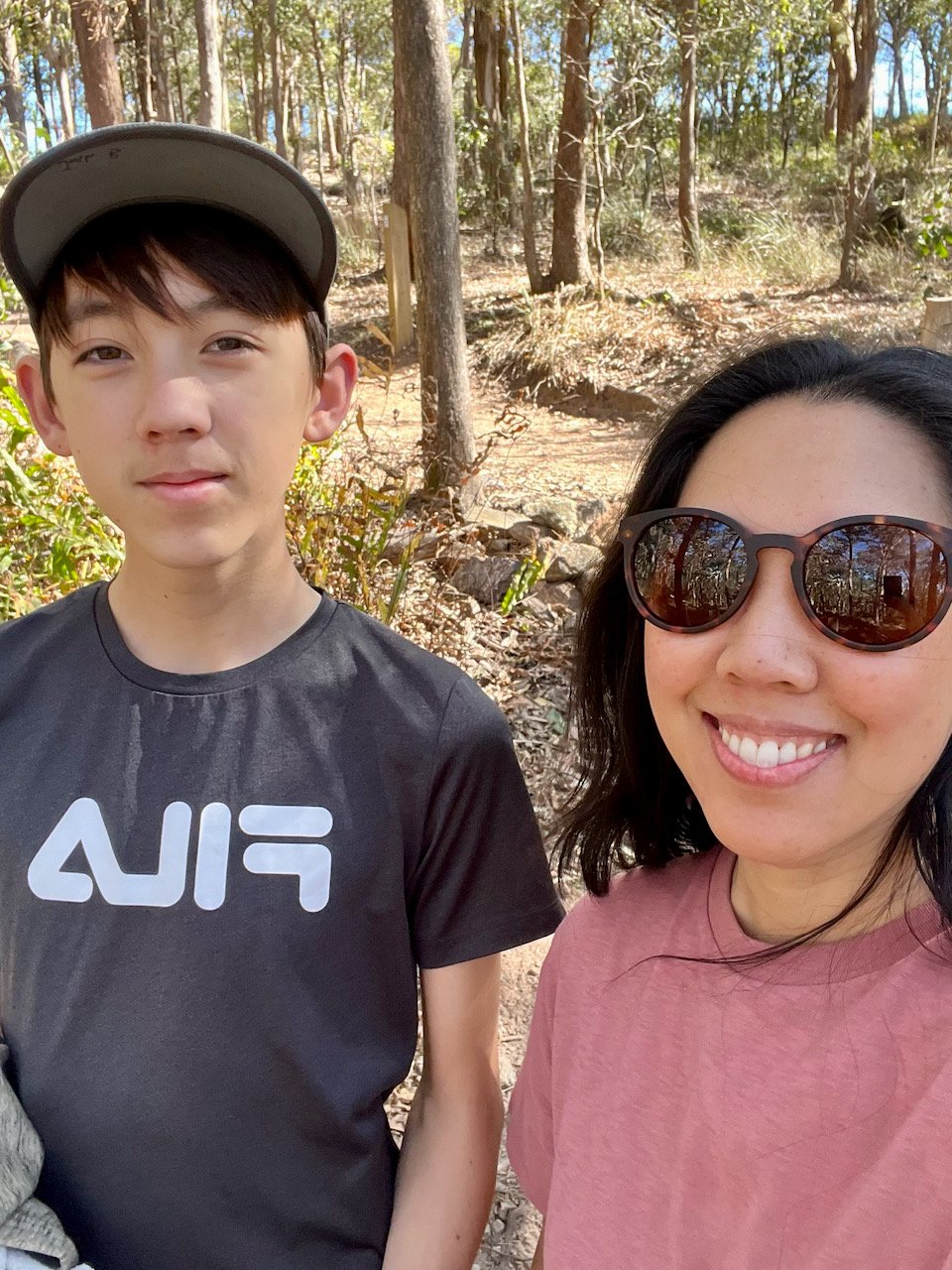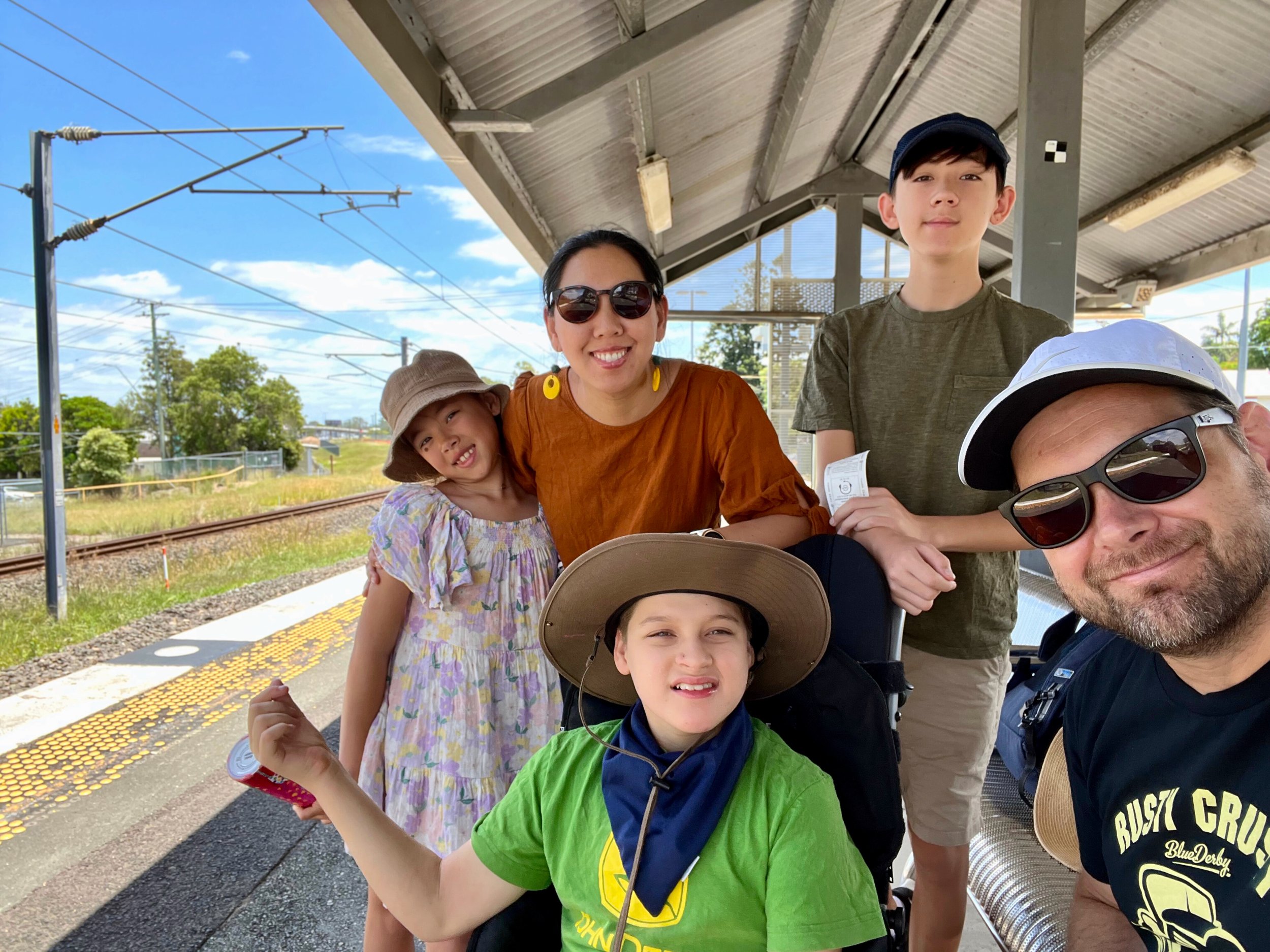Sibling Care
An interview with Di
This article is part of a series of interviews with families experiencing disability and their faith.
Di’s family of origin, she is on the far left next to her twin sister.
Di is someone full of life. Driven, passionate about what she believes in, and caring. She’s also “emotional” in her own words. Di is one of six children, the first twin and eldest of the family, but only just. At one point, Di shares, all six children were under seven, needless to say her mum was “very busy.” On the surface, it seems the apple didn’t fall far from the tree!
Becoming a parent to her son Tim had a sweeping effect on Di’s life, even on her career path. “I became a special ed teacher because of Tim” she shares. “I knew from his diagnosis that he was going to be non-verbal, and I knew literacy was the foundation of communication. When you can read and write, you can say anything you want. So I went back to do further studies in special ed to learn about teaching literacy to people who had an intellectual impairment and who were non-verbal. My core studies specialised in complex communication needs, so I learned all about AAC (Augmentative and Alternative Communication), and how to interweave that with literacy.”
During her studies, Di was approached by the head of department at Tim’s school with a job offer for an early childhood development teacher. She accepted the offer and seven years later has not lost her passion for the role. Di shares,
“I love it because there's something very unique about being a teacher and a parent of a child with a disability in a special school. It really helps me walk alongside parents. The kids I teach are three to five years old, and some of them are just receiving a diagnosis. Their parents are navigating the NDIS, they're trying to find therapists, and I've been through all of that.”
Di shares on a more personal note, “Looking back I think about how God has used Tim in my own life and career, and that he's brought out gifts in me for teaching in this specialty field of young kids with a disability, all because of Tim. I just love how that's been orchestrated throughout my life.”
One of Di’s other passions is sibling care. The needs of siblings of children with additional needs can often be overlooked, according to the Sibling Support Project who state on their website,
“Throughout their lives, siblings share many of the concerns that parents of children with support needs experience, including isolation, a need for information, guilt, concerns about the future, and caregiving demands. Siblings also face issues that are uniquely theirs, including resentment, peer issues, embarrassment, and pressure to achieve.”
Di and her husband Ed have three children, Josh (14), Tim (12) and Lilli (9). I ask if she could share Tim’s story with me. Di recounts the early days and years of his life, “when Tim was two weeks old, he had a bowel infection and was in ICU for two weeks. He was really sick and was diagnosed with failure to thrive. He also had strabismus, where your eyes turn out, and had surgery for that at 13 months.”
Di holds newborn Tim in the ICU
Tim was diagnosed with global developmental delay (GDD) at the end of that season, which Di found hard to accept. She reflects, “I thought he was delayed because of all his medical diagnoses.” This wasn’t the last diagnosis Tim received. The next one came from left field. Di recalls,
“I had a friend who was a physio who worked with kids with disabilities visit us one day. She messaged me two weeks later and said, ‘I think Tim might have Angelman syndrome, he really reminds me of some of the students I work with.’ I was really offended at first. I thought ‘she doesn't even know me well, how can she say that about Tïm, he's just delayed because of all this medical stuff.’ But then I Googled it, as you do, and found out that he met all the criteria for Angelman syndrome. I think I accepted it then even without a proper diagnosis because, somehow in my heart, I just knew that's what he had.”
While researching, Di soon came across the ‘Angelman community,’ “which really, really helped us and supported us well.” She explains, “without a community around you, such as the Angelman community, you feel like no one else really knows what you're going through with that diagnosis… how it feels to know ‘my child's never going to talk.’ The other parents in the group had been in exactly the same place we had. Even our extended families didn’t ‘get it’ in the same way.”
Di shares more about the syndrome that Tim experiences, “Angelman syndrome is a spectrum. You will have kids who are not mobile [walking] at all, and you'll have kids who don't eat so they need to be PEG fed through a stomach tube, whereas Tim can walk and feed himself. There are some similar traits between kids; they're often quite happy kids, often have sleep disorders, balance disorders, and they almost always have epilepsy. Tim has seizures as well.”
Tim uses a PODD (Pragmatic Organisation Dynamic Display) book to communicate
Tim communicates with Di and his teachers using a PODD book (a book of symbols and words to support communication) and uses gestures to communicate with others. He needs help for all his daily activities. At night, Tim stirs around midnight, and either Ed or Di will relocate to his room. Another effect of Angelman’s on Tim, Di shares, is that he’s highly motivated by food, and will eat to the point of vomiting. At night he’s often awake for 3 hours at a time. Add to this a Houdini-like ability to work his way into child-proof cupboards and it’s clear why Tim needs 24/7 supervision.
With a glimpse into Tim’s daily life, I’m keen to hear Di share about his siblings, and what sibling care looks like for them. She explains, “so often siblings become carers for their sibling with a disability. That's certainly true of my oldest son Josh, he's definitely our second carer, second in command at home. But I want him to have a childhood as well, to be a teenager, that's really important to me. I often remind him 'your brother is not your responsibility. I don't expect you to grow up and have to look after him one day.' I love that he wants to help us, but I don't want him to feel like it's expected of him.” Even with this reassurance, Josh wants to help out. Di shares, “if we can't get a support worker and we need to go out at night, Josh will now look after Tim and put him to bed and give him a bath.”
Left: Lilli and Di attended Wicked together, their third musical. Right: Lilli and Ed skiing
Even though they’re not able to give as much time to Josh and Lilli, Tim’s siblings, Di and Ed are very intentional parents. Di shares “I know what each of their love languages are, and I think that's really important because loving them in their love language makes them feel seen and cherished.” She continues, “Lilli's is definitely quality time and physical affection. So, just spending time with her doing what she loves to do, playing board games, taking her for a swim or taking her bowling, she absolutely loves that. Even just putting her to bed at night and laying next to her, she really, really loves.”
Love languages are unique. Di shares, “Josh is more of an ‘acts of service’ kid, and quality time.” Intentional time with him looks like “taking him out one-on-one and doing things he likes,” such as playing sport, hiking and eating out. “We take a very keen interest in all of his interests (...) so we attend every music event, every sports game, activities like that, just to help him know how important he is to us, that our lives are not just focused on Tim.”
Josh and Di on a hike together
Di opens up about Josh’s experiences as a sibling to Tim. Josh is very close to his male cousins who are a similar age, “We go on holidays a lot with Josh’s cousins and their family. I think when Josh sees them, he thinks about what Tim might be like if he didn't have Angelman syndrome and what they might’ve done together as brothers.” Di adds “I think at times Josh sees how easy daily life seems to be for them in their household. It’s a huge contrast seeing how we do holidays and how they do holidays. There's so much more planning, effort and supervision required when we go on holidays with Tim and it's exhausting. We still do it because we'd love to travel but it's definitely not easy.”
Outings and holidays take a lot of planning and effort
Lilli, like Josh, grieves what she’s not able to do with Tim. But Di shares, she’s “really wonderful with Tim and such a caring sister. I think it must be hard for her to have to look after and care for her older brother, it’s not natural in a way for a younger sibling. But she is so good at reassuring him, using his PODD with him. It’s not easy being the only sibling at school that needs to look out for him, but she’s doing a really good job.”
Though Di speaks of Lilli as “very caring, lovely and kind,” she shares honestly,
“It took her a while to want to help with Tim. She gets annoyed with him. She's a little sister after all, and Tim had treated her like a little sister. He used to pull her hair and kick her. I think Lilli has had to really come around to wanting to support his needs. For example, I'll say, ‘Lilli can you watch him for a little bit while I go out to get the washing’ and she'll say ‘okay’ reluctantly. It's taken her a little while. So, I guess I want to say, ‘don't always expect siblings to want to look after their sibling with a disability.”
On the other hand, as a brother, Tim offers his siblings something that is beautiful and unique. Di shares,
“Tim is a kid who gives unconditional love. He is very affectionate physically and he will not hesitate to show you. He's always hugging us, or resting one of his legs on us, or wanting to touch us. I think Josh and Lilli both love that. Even though Josh is not a hugger (he doesn't like touch at all) he will receive Tim's hugs. It brings a smile to his face, and Josh is a teenager so he doesn't smile that much!” [Di laughs].
Left: Josh and Tim. Right: Lilli and Tim
Josh and Lilli’s experience as siblings to Tim has had a profound influence on them. Di shares,
“Tim has really taught and shown them that they're different from their friends because they have a brother like him. From my perspective, it's shown me where their kindness, compassion and empathy have come from. They might not have had those traits to the same degree if they didn't have a brother like Tim. They're really so much more open to people who are different. Josh and Lilli see Tim as a blessing, and we talk about that a lot. We talk about how Tim's a blessing to us because without him we wouldn't be so patient or have learnt all the other things that Tim has taught us. We wouldn't be able to communicate in a different way, a way that Tim's taught us to.”
But it hasn’t stopped them lamenting that Tim has additional needs and struggles;
“We all think it would be so helpful if he could talk. Even though he has AAC, he can't say everything he wants to say with it. He might use AAC twenty percent of the time, but eighty percent of the time he relies on gestures, vocalisations and eye contact… and you really can't say too much with those things. So, it certainly frustrates him and frustrates us when he can't communicate what he wants to say. We definitely say that we wish Angelman syndrome didn't exist; we say that all the time.”
Above all, Di shares, the family talks together about how, “even though we go through struggles, we still have hope and we can trust in God. We’re often reminding the kids that tomorrow's a new day for new mercies.”
Stay tuned for Part 2 of Di’s story on self-care.
Sibling perspectives
The following is a summary of thoughts expressed by siblings of people with disabilities, from a recording of a ‘Joni and Friends family retreat.’
Consider as you read through, are these statements similar or different to the way siblings might feel in your family? Could you use these as a springboard for your children to share their own experiences and to pray with them?
Resources
Siblings Australia has run for 25 years, providing support and advocacy for siblings of people with disability and chronic illness. They’re committed to providing relevant programs and supports for siblings of all ages. https://siblingsaustralia.org.au/
Books and movie recommendations for siblings of all ages https://siblingsaustralia.org.au/books-movies/
SibWise online learning program (self paced) assists parents and professionals to better understand and respond to sibling needs and challenges. https://siblingsaustralia.org.au/services/sibwise/
Tips for Parenting Siblings of Kids with Special Needs by Joni and Friends (Christian resource) https://joniandfriends.org/uncategorized/tips-parenting-siblings-kids-special-needs/
Online flip book for siblings https://heyzine.com/flip-book/4fabe2be16.html#page/1
Fiona Jongsma
This article was first published in The 139 Collective
